The MCL campaign 2023 in Ardhi University invited students to innovate smart digital solutions for managing urban green spaces, with special attention given to the Pande Game Reserve revitalization process. Read short stories below!
Story 1: Working in multi-disciplinary teams
Multi-Competence Learning (MCL) endeavors to equip undergraduate students with essential digital geospatial skills, fostering innovation and the capacity to collaborate as multidisciplinary teams to tackle societal challenges. The MCL model facilitates collaboration among students from diverse disciplines, encouraging them to leverage their specialized knowledge and skills to address pressing societal issues collectively. Through this approach, participants also gain proficiency in using digital geospatial tools and data to confront multifaceted challenges.
The inaugural MCL1.0 campaign in 2022 was centered around addressing the overarching theme of "Poor Solid Waste Management in Dar es Salaam City." Subsequently, the focus of MCL2.0 at Ardhi University, shifted to the challenge of "Sustainable Management of Urban Green Infrastructure."
MCL1.1 and MCL2.0 drew participation from approximately 26 and 22 students, respectively. These students were carefully selected from various academic departments, ensuring representation across a spectrum of disciplines. Among them were Geospatial Sciences and Technology (GST), Urban and Rural Planning (URP), Computer Systems and Mathematics (CSM), Civil and Environmental Engineering (CEE), Economics and Social Studies (ESS), Civil and Environmental Engineering, Quantity Surveying, and Building Economics.
The formation of groups was meticulously orchestrated to maintain a gender balance between male and female students. Each group was composed of members from different disciplines, fostering collaborative teamwork. This composition resulted in groups of four or five students, wherein each member represented a unique discipline, collectively striving to devise innovative solutions to societal challenges
Story 2: Working with stakeholders - the power of collective efforts
MCL faced a significant challenge in identifying and engaging the right stakeholders for the green spaces in Dar es Salaam city, particularly in the ambitious endeavor to revitalize the Pande Game Reserve. The vision was ambitious – a transformation of the game reserve into a vibrant, eco-friendly space serving as a hub for recreation and community gatherings. However, this vision faced numerous obstacles, and the project's success relied heavily on collaboration with a diverse set of stakeholders. The initial hurdle was to compile a comprehensive list of stakeholders, including local residents, environmentalists, city officials, and various interest groups, each bringing unique perspectives and expectations. Undeterred by the complexity, the MCL experts embarked on individual meetings with these stakeholders, attentively listening to their concerns and aspirations for the park.
Navigating the varying interests proved challenging as environmentalists were steadfast about preserving the park's natural habitat, while some residents expressed concerns about potential disruptions during revitalization. Recognizing the need for finesse and collaboration, the experts organized a community forum, providing a platform for all stakeholders to openly share their thoughts. Through facilitated discussions, every voice was heard, and collaborative solutions were sought. To address environmental concerns, MCL collaborated with local conservationists to develop a sustainable plan preserving the park's ecosystem. Simultaneously, architects and urban planners were engaged to design a space meeting the recreational needs of the community.
The project faced a setback with funding issues, yet undaunted, MCL proactively engaged potential sponsors, local businesses, and city officials to secure necessary resources. Through persuasive presentations and a shared vision for the park's future, the team garnered the support required to breathe life into the project. Despite ongoing challenges such as construction delays, unexpected weather patterns, and evolving community dynamics, the team demonstrated resilience. Transparent communication played a pivotal role, with regular updates to stakeholders and addressing concerns head-on. This transparency, built trust and reinforced the collective commitment to the shared goal.
In the end, the Pande Game Reserve revitalization project proved to be a resounding success. Stakeholders, once skeptical and divided, emerged as champions of the transformed space. Envisioned as a symbol of unity, environmental stewardship, and community pride, the game reserve is poised to become a beacon for harmonious collaboration. Approaching the pitching day, the team reflected on the journey. The daunting challenges had served as catalysts for collaboration and innovation. The Pande Game Reserve stood not only as a physical testament to the power of collective effort but also as a vibrant space where stakeholders, once divided by differing perspectives, now came together in harmony.
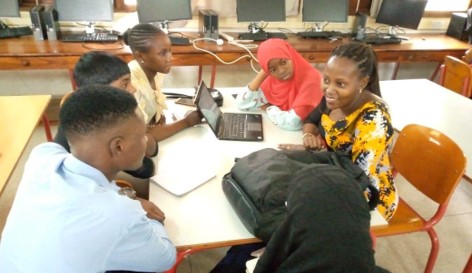
A stakeholder from Kinondoni Municipal Council exchanging ideas with MCL group members.
Story 3: Pitching the innovative solution - The SMART Green Spaces Maintenance System
Amidst the buzzing excitement of Ardhi University's MCL 2.0, a team named "Green-Tech" emerged with their groundbreaking project: the SMART Green Spaces Maintenance System. Composed of environmentally conscious students the team aimed to revolutionize the way urban green spaces were managed and sustained using Pande Game Reserve in Dar es Salaam as a case study. Their project began with a comprehensive analysis of the Pande Game Reserve. The team identified challenges such as a lack of location data concerning plant species, and a lack of an automated system to water the plant species with necessary nutrients. The SMART Green Spaces Maintenance System was conceived as a solution to address these issues using a combination of Geospatial technology and Information and Communication Technology (ICT).
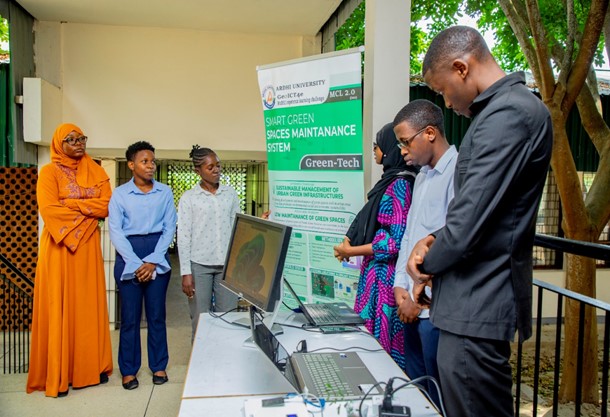
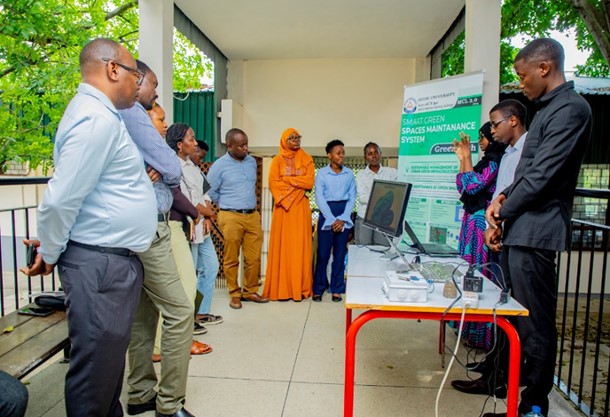
Green-Tech team Pitching and presenting their poster at MCL2023 closing event.
The day of the pitch arrived, and the "Green-Tech" group stood proudly next to their vibrant posters, showcasing a map consisting of systems and plant species location and their routes, and a system circuit diagram for a smart green space maintenance system. The room buzzed with excitement as they began their presentation, blending technical data with a narrative that resonated with the community. The Green-Tech team came up with an innovative solution, that is A Smart system designed to gather environmental data about plant species. It utilizes a mechanism to display the location of each plant and species. The system includes an automated watering mechanism that ensures the necessary nutrients are supplied to the plant species. All the collected information is transmitted to a web server through an Application Programming Interface (API), which can be easily accessed via a website at Pande Game reserve.
Story 4: Experiences from MCL inaugural and culmination events
A sense of anticipation buzzed through the halls of Ardhi University as students and faculty gathered for the grand inauguration of the Multicompetence Learning Challenge (MCL). The atmosphere crackled with excitement as the Deputy Vice-Chancellor for Academic Affairs took the stage, ready to kickstart this innovative venture. His words echoed the ethos of the MCL, emphasizing the power of collective learning and the significance of tackling real-world challenges. The Head of the Department followed, setting the tone for the day and highlighting the importance of collaborative problem-solving.
The event soared as participants delved into the core concepts of the challenge, exchanging ideas, and forming groups. Enthusiasm was palpable as diverse minds converged, each eager to contribute their unique perspective to the collective endeavor.
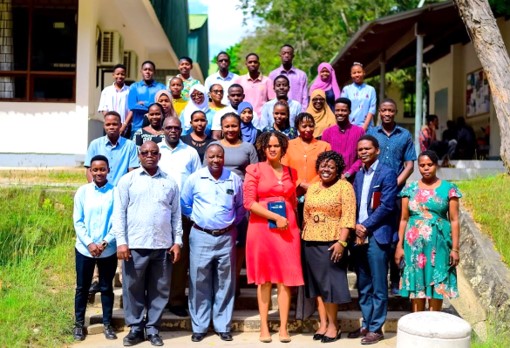
Group photo of experts and MCL alumni 2023.
The MCL Closing Event: The Culmination
Eight weeks of dedication, collaboration, and ingenuity culminated in a crescendo of achievement at the closing ceremony of the MCL. The Director of Postgraduate Studies, Research and Publication representing the Deputy Vice-Chancellor, graced the stage, radiating pride at the incredible journey undertaken by the participants.
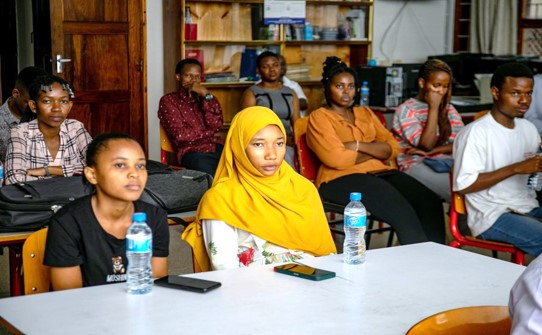
MCL participating students listening attentively to the remarks by the The Director of Postgraduate Studies, Research and Publication.
Certificates were awarded, each representing not just participation but a commitment to innovation and problem-solving. Yet, the true highlight was the student pitching session, where fervor met eloquence as students passionately shared their journey, unveiling actionable problems, and ingenious solutions crafted through relentless efforts and unwavering determination.
Pitching: Unveiling Ingenuity
The air hummed with anticipation as students stepped onto the stage, their faces a mix of nerves and determination. Each presentation was a narrative of perseverance, innovation, and unwavering dedication. From sustainable urban planning proposals to innovative tech solutions for environmental conservation, the students’ pitches were a testament to their ingenuity. The audience was spellbound, witnessing the depth of research, the elegance of solutions, and the passion that fueled every idea.
Students pitching their solution
As the last pitch concluded, thunderous applause reverberated through the hall, acknowledging not just the ideas but the spirit of multicompetence and collaborative learning that had ignited during this extraordinary journey. The Multicompetence Learning Challenge had not just been an event; it had been a transformational experience, fostering a community driven by innovation, collaboration, and a relentless pursuit of solutions to real-world problems.
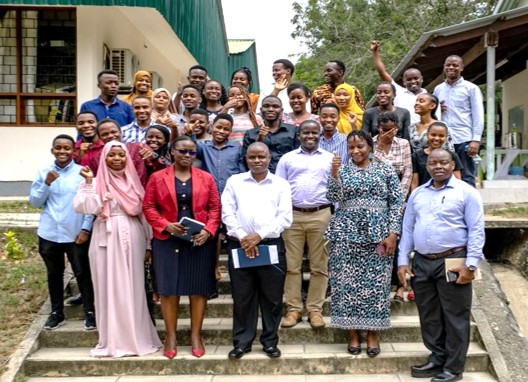
A group photo after closing events.
Story 5: Pande Game Reserve - From hidden treasure to premier tourist destination
Using Pande Game Reserves as a case study, students embarked on an intellectual odyssey. Working together, they pooled their creativity and expertise to conceive actionable solutions that would breathe new life into this natural haven. Through their hard work and dedication, the students were able to conceptualize how Pande Game Reserves would be brought to new recreational places. The area was quickly proposed to become a popular tourist destination, drawing visitors from all over the world. With the implementation of their eco-tourism initiatives, the students had successfully proposed how Pande Game Reserves can be transformed into a beacon of excellence in the heart of Dar es Salaam as a premiere tourist destination. The future of Pande Game Reserves is bright, and a new era of conservation has begun. The image below depict one of the ideas that students have conceptualized to make Pande Game Reserve a premiere tourist destination when their proposal becomes a reality.
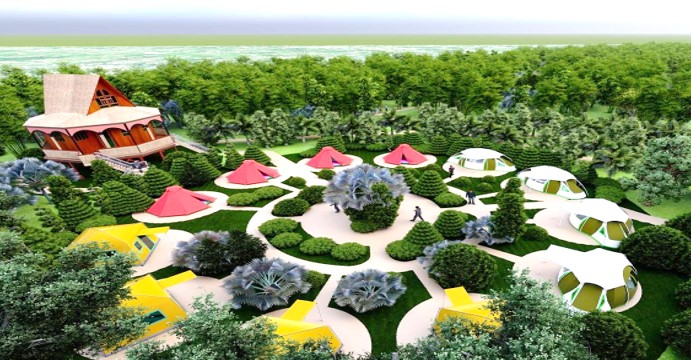
The proposed camping are in the Recreation zone at Mabwepande Game Reserve.